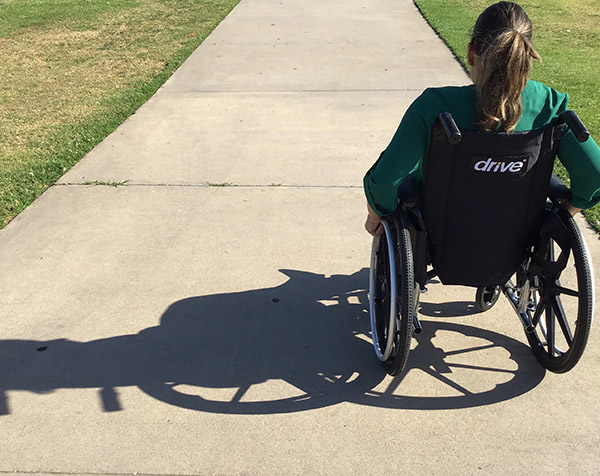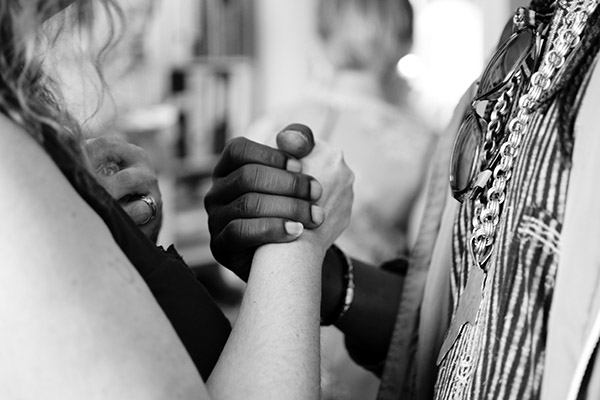“What happened to you?”
If you’re a person with a visible disability, chances are you have been or will be asked this question at some point in your life. It’s not uncommon for the people asking this question to be complete strangers. It may take different forms: “Can I ask why you use a wheelchair?” “What happened to your arm?” You may even get, “What’s wrong with you?” This last one is perhaps the most uncomfortable one to hear – no one likes to think that there is something wrong with them, or that others see them that way. Some people believe it’s rude for a stranger to ask them what their disability is – some people feel it’s rude even if it’s someone they know. Others aren’t bothered by the question at all, no matter who is asking it; they would rather people ask questions than simply stare or remain awkward around disability.
What should your response be when somebody asks what happened to you? In my opinion, the answer to that is highly subjective. Some are willing to educate people about their disability, seeing it as an opportunity to build bridges between the disability community and the able-bodied community. Others feel that as people with disabilities they already deal with the burden of discrimination from the able-bodied community, and they do not want the expectation or responsibility of educating that same community. They would rather able-bodied people take responsibility for educating themselves about disability.
And some people, like myself, have feelings towards the question that change from day to day, month to month, year to year, even hour to hour. If I’m having a good morning — low pain, high energy, not rushed — I may feel like I’m in a space where educating someone about my disability feels like something I could do. Later that day my pain may worsen, as it tends to do, and I will no longer want to answer a stranger’s questions at all.
Discovering the Choice
Back when I first became a wheelchair user at age twenty-two, I was hit with the “What happened to you?” question quite often. (The frequency really dropped off when I hit my thirties; food for thought.) During the first few years of my disabled life, I didn’t know how live, how to act, or how to be. I was new to so many aspects of what it meant to be visibly disabled and in the public eye: How it felt to have people stare at me; the strangeness of being an adult yet being treated like a child; and the intrusive questions I couldn’t seem to escape.
Strangers would approach me and asked me what happened to me. When I say “strangers,” I mean it in the most literal sense of the word: People would make a beeline for me and, without a “How’s it going?” or asking my name or telling me theirs, the first words out of their mouths would be, “What happened?” Not even a hello. (And yes, these were full-grown adults, not children.)
In those early days I felt compelled to answer their blunt and demanding approaches. At that point in my life, I had had little experience standing up for myself. I was also dealing with PTSD, depression, and anxiety, not to mention chronic pain. It just seemed safer to tell people what had happened to me (“I was in a car accident and broke my back”) so I could avoid any confrontation. Never knowing when someone was going to “pop the question” added stress to my life because I felt like I didn’t have a choice but to answer it. It wasn’t until about seven years into my disability that I realized I didn’t have to answer if I didn’t want to.

In those early days I felt compelled to answer their blunt and demanding approaches. At that point in my life, I had had little experience standing up for myself. I was also dealing with PTSD, depression and anxiety, not to mention chronic pain.
Mums the Word
I remember the very first time I declined to answer; I had mentally prepared myself for the moment because I knew it wasn’t going to be easy for me. I was on a sidewalk near my home. A woman walked towards me, and when she was about ten feet away from me she blurted out, “What happened to you?”
“I’m sorry,” I replied, my heart pounding. “That’s personal health information, and I don’t know you.”
She stopped walking and drew herself up a bit. “Oh,” she said with surprise. “Well, my sister is in a wheelchair, that’s why I asked…”
I nodded and started pushing myself past her, wanting to leave the situation quickly. She gave me a wide berth, looking a little embarrassed as she did so. To this day, I feel a bit guilty about it. I’ve said similar things to people since without regret, but that one sticks with me — maybe because it was the first time.
I tried to be polite to her. I think I could have worded it better. My nervousness might have put an edge to my voice. I hope I’m better these days at communicating compassion for the awkwardness of the situation while still gently setting my boundaries.
When I responded to the woman on the sidewalk I used the phrase, “personal health information.” I’ve always felt this to be quite effective in getting the message across in a way that most people can understand immediately. I think it can also trigger for them the realization that, yes, that is exactly what they are asking for, and perhaps not everyone is open to such a personal question from a stranger.
You don’t have to answer the question if you don’t want to. It’s such a simple concept, yet not always an easy one to put into practice. Many of us have bodies that seem to scream out to the world, “Hey, I’m disabled!” We may feel like since our disabilities are so obvious and “in everybody’s faces” all the time that we somehow owe it to the world to explain them, especially if somebody asks. But just because our disabilities are visible does not make them automatically up for public examination. We have a right to privacy, even if our conditions pique the curiosity of others.
I remember the very first time I declined to answer; I had mentally prepared myself for the moment, because I knew it wasn’t going to be easy for me. I was on a sidewalk near my home. A woman walked towards me, and when she was about ten feet away from me she blurted out, “What happened to you?”

Tell the truth
Keeping It Short
You may find that you feel alright with talking about what happened to you. Maybe your concern is more about how detailed you should be – how much does the person asking you want to know? How much do you want to tell? It might be a good idea to have a basic response at the ready so that in the moment you aren’t fumbling for an answer. If the person wants to know more, then it’s their choice to ask for more information.
If they do ask for more, it’s your choice to provide it or not, depending on whether or not you’re comfortable doing so. Perhaps you’re OK with telling them what your disability is, but not how you acquired it or how it came about. Our disability origin stories can be scary, painful, or even traumatic, and sometimes we don’t want to talk about them, and that’s absolutely fine.
If you don’t want to give any more detail than a short explanation, you can simply say, “Actually, I’m not really comfortable talking about it in detail. Thank you for understanding.” Set your boundary in a firm yet kind manner. A quick change in subject does wonders to smooth over any awkwardness that may crop up at this point: “I really like your shoes, by the way.” “Boy, it’d be nice if the sun came out once in a while, eh?”
Or you can simply continue on and go about your day. You don’t have time to take care of a stranger’s feelings. You’ve got places to go and things to do!
The Extended Version
On the other hand, you might find that you do want to talk in detail about what happened to you. Some people find talking about their disability experiences with other people cathartic. Yes, our disability origin stories can be very intense and therefore hard for some of us to talk about – but this same intensity can also drive some of us to want to share our stories with just about everyone we meet. I’ve experienced both feelings at different times in my life. You may be at a point where you feel like you want to wear a T-shirt emblazoned with the words, “ASK ME WHAT HAPPENED.”
Educating people and making them feel more comfortable with disability are also reasons you may want to talk about it. Many able-bodied people are uncomfortable being around people with disabilities. This is partly because of lack of interaction with us. We are somewhat of a mystery to them, and this ignorance leaves a vacuum that is ready to be filled with misconceptions and stereotypes.
The question, “What happened to you?” can be an opening to a more involved conversation about disability – or about topics that have nothing to do with disability at all. What’s important is that able-bodied people start to see people with disabilities as individuals who have differing personalities and needs, and that we are each unique beings that often defy the stereotypes they may believe about us. Talking about our lives can also show them that we’re not so different from them: We also worry about our kids; pay our bills; and get frustrated that our favorite team lost again.
Talking about your disability can also connect you with others in ways you might not expect. Many people have hidden disabilities or health issues, and when they see someone with a visible disability they may see someone with whom they can be open about their own impairments — someone nonjudgmental who can empathize with them. Or perhaps their spouse or partner has the same disability as you do, and they’re glad to finally meet someone who’s familiar with the challenges that can come with it (it may be hard for either of them to meet others with the same disability, especially if the condition is rare or they live in a sparsely populated area).
Talking about your disability can also connect you with others in ways you might not expect. Many people have hidden disabilities or health issues, and when they see someone with a visible disability they may see someone with whom they can be open about their own impairments.

Use Your Imagination
If you don’t want to reveal the truth, another option is to make something up. This can be a fun one. There’s a lot of range here: You can make the story fun and light-hearted or you can go all the way to snarky and sarcastic. You can make it sound totally believable – complete with lots of details — or you can keep it short and strange, making it obvious that you’ll never give up the truth. Here are some ideas to get you started:
“It was a shark attack.”
“Well, they say lightning never strikes the same place twice, and they were right – it struck me three times, can you believe it?” (Shake your head in wonderment.)
“I was at Yellowstone National Park and I got too close to one of those buffalo. I guess they really meant it when they told us to stay away from the wildlife!”
“Nothing happened, I’m just too lazy to walk.”
“Oh no, I forgot my [insert your missing body part] at home today…Is it really noticeable??” (Be sure to look worried.)
“Evil spirits.” (Look around anxiously, as if those same spirits might be summoned simply because you spoke of them.)
And finally…
“I asked someone what their disability was.”
That last one is, of course, usually for those of us who do not enjoy dealing with the question, “What happened to you?” Even that last reply, though, can be delivered in such a way that it could be received positively: say it in a teasing but warm manner. After they get the joke, you can laugh and tell them you actually aren’t going to talk about what happened; or maybe tell them you’re only kidding and then proceed to tell your story.

And our choice to share or not share with others is just that: our choice. The expectation from the people asking for our stories may be that we will indeed share them. However, we do not need to fulfill that expectation if we don’t want to, though the social pull to do so is strong.
There are about as many ways for people with disabilities to respond to the question, “What happened to you?” as there are opinions about whether — and how — it should be asked at all. Whatever your opinion is, it’s important to remember that not every disabled person feels the same about it. I believe that we should respect each other’s positions on this matter. We all have our reasons for why we feel the way we do about such a highly personal part of our lives, and how we chose to share it with others.
And our choice to share or not share with others is just that: our choice. The expectation from the people asking for our stories may be that we will indeed share them. However, we do not need to fulfill that expectation if we don’t want to, though the social pull to do so is strong. Our stories are hard won — often with literal blood, sweat, and tears — and we owe it to ourselves to make sure that we are the ones who decide what happens with them, whether that be safely keeping them inside, sharing them with a chosen few, or proudly displaying them for all the world to see.

